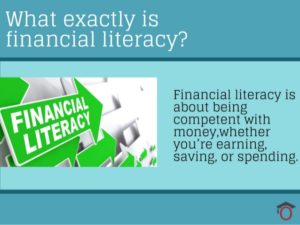 The economic crisis of 2008 was mainly the result of irresponsible financial actions from Wall Street on down to Main Street, USA. To ensure that this never happens again, the federal government wants us to promote financial literacy education.
The economic crisis of 2008 was mainly the result of irresponsible financial actions from Wall Street on down to Main Street, USA. To ensure that this never happens again, the federal government wants us to promote financial literacy education.
To put it simply, because many families are now struggling with money issues, we “need” financial education. The people who get to make decisions about what our children learn in school all “need” to share the blame for our national financial problems. Let’s take a look at them.
Legislators
Have you noticed that most state and national politicians do not come from the education profession? Yet they get to make legal, binding decisions about what our children should study in school.
Ohio students are required to have four full math credits before graduation—most of them classes like algebra, geometry, and trigonometry. When was the last time you needed to calculate the angle of an isosceles triangle? But every day we make money decisions, purchase consumer items, borrow money to acquire cars and homes, and use credit. That is the kind of practical math education I can really get behind. Since 2010, all Ohio students are required to complete “some” financial education before they graduate. But there are no time parameters around the requirement, so school districts can do whatever they want.
School Boards and Administrators
Over the last three decades, one method schools have used to balance their budgets is to cut life skills education (home economics and/or industrial arts) from the curriculum and now it is payback time.
The core subjects currently taught in Family and Consumer Sciences (new name for home economics) classes are foods and nutrition, financial education, and human development. Look at how those subjects impact your life on a daily basis as an adult–parenting, child development, personal relationships, food safety, nutrition, cooking skills, basic budgeting, credit, housing, investing for the future, retirement, and shopping skills are just a small slice of what is taught in those classes. How much of our state budget committed to health and human services could be cut if students actually learned how to take care of themselves and their future families while they were still in high school?
Parents
Last to be singled out are parents. How many parents do you see sharing financial and/or other money issues with their children? How many require their kids to earn their own spending money? Children don’t automatically learn how to be self-sufficient, budget their money, or develop a work ethic by osmosis. More than ever, parents need to encourage their kids to take classes in school that will benefit them every day as adults. If they can reinforce that with their own skill-set of practical knowledge at home, students will have the tools they need to succeed.
Bottom Line
We spend 13+ years being schooled to prepare us for the next 60+ years of our lives. Let’s make sure that what is being taught reflects our needs over that time frame.

